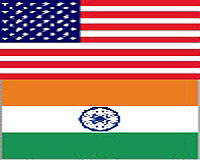| . |  |
. |
Tokyo (AFP) Jan 19, 2010 Japan and the United States on Tuesday marked the 50th anniversary of one of the Cold War's defining security pacts, but an unprecedented level of mistrust between the allies kept celebrations muted. No major state events or ceremonies were planned in Tokyo to mark the milestone treaty, in which the former World War II adversaries in 1960 stood united against communist Russia and China. Half a century on, the alliance has been strained since a centre-left government took power in Tokyo four months ago, vowing more "equal" ties with Washington after more than five decades of almost unbroken conservative rule. The government has signalled a new embrace of Japan's pacifist stance and announced a review of key agreements governing the often-unpopular US military presence in Japan, where 47,000 American troops are now based. Prime Minister Yukio Hatoyama last week ended a naval refuelling mission that has backed US-led forces engaged in Afghanistan since 2001, and has announced a review of a pact on the relocation of a major US airbase. US President Barack Obama's administration has repeatedly asked Japan's new leaders to stick by the original agreement, under which a new Marine Corps airbase would be built on the southern island of Okinawa by 2014. Despite the row, both sides praised the treaty signed on January 19, 1960, which strengthened a 1951 pact allowing US forces to be stationed in Japan while providing for the nation's defence under the US nuclear umbrella. In a joint statement by their foreign and defence ministers, both countries called the treaty indispensable and "the anchor of regional stability." Secretary of State Hillary Clinton in a video message on the US embassy website said that "although the world has changed greatly over the past 50 years, this alliance is no less critical today than it was in 1960." She added: "The United States is committed to strengthening this partnership as we embark on this new century. I am confident that our alliance will adapt, thrive and be even stronger in the years and decades ahead." Hatoyama said it was thanks to the pact "that Japan has maintained peace, while respecting freedom and democracy, and enjoyed economic development in that environment since the end of the last world war to this day." He said he plans to "further deepen the US-Japan alliance... in order to adapt to the evolving environment of the 21st century. I would like to present the people of Japan with the results of this work before the end of this year." The anniversary was marked by a naval ceremony with 300 sailors from both countries, led by Japan's naval commander Vice Admiral Masahiko Sugimoto and Rear Admiral Richard Wren, commander of US naval forces in Japan. But no Japanese politicians or diplomats and no US officials or embassy staff attended the event at Yokosuka port, a US base southwest of Tokyo. The two countries "can't celebrate this occasion in a big way because it is unclear how Japan wants to change the alliance," said Tetsuro Kato, a political science professor at Hitotsubashi University. "They couldn't say anything more than to confirm that the past 50 years were good." US Ambassador John Roos said the treaty remains important because of new challenges to both sides, citing "North Korea's ballistic missile and nuclear programmes and the lack of transparency in China's military buildup." Writing in the Asahi Shimbun, he noted that "Japan benefits from the assistance of US forces in its defence and is able to spend far less on its own defence, as a percentage of GDP, than any other state in the region."
Share This Article With Planet Earth
Related Links Learn about the Superpowers of the 21st Century at SpaceWar.com Learn about nuclear weapons doctrine and defense at SpaceWar.com
 In India, Gates to promote US ties with 'global power'
In India, Gates to promote US ties with 'global power'Washington (AFP) Jan 17, 2010 Defense Secretary Robert Gates heads to India this week to promote a blossoming "strategic partnership" with a country that has strongly endorsed the US-led mission in Afghanistan. Defense officials said Gates' two-day visit is part of an effort to cultivate a broad relationship with India, a country Washington recognizes as an increasingly powerful player on the international stage. ... read more |
|
| The content herein, unless otherwise known to be public domain, are Copyright 1995-2009 - SpaceDaily. AFP and UPI Wire Stories are copyright Agence France-Presse and United Press International. ESA Portal Reports are copyright European Space Agency. All NASA sourced material is public domain. Additional copyrights may apply in whole or part to other bona fide parties. Advertising does not imply endorsement,agreement or approval of any opinions, statements or information provided by SpaceDaily on any Web page published or hosted by SpaceDaily. Privacy Statement |